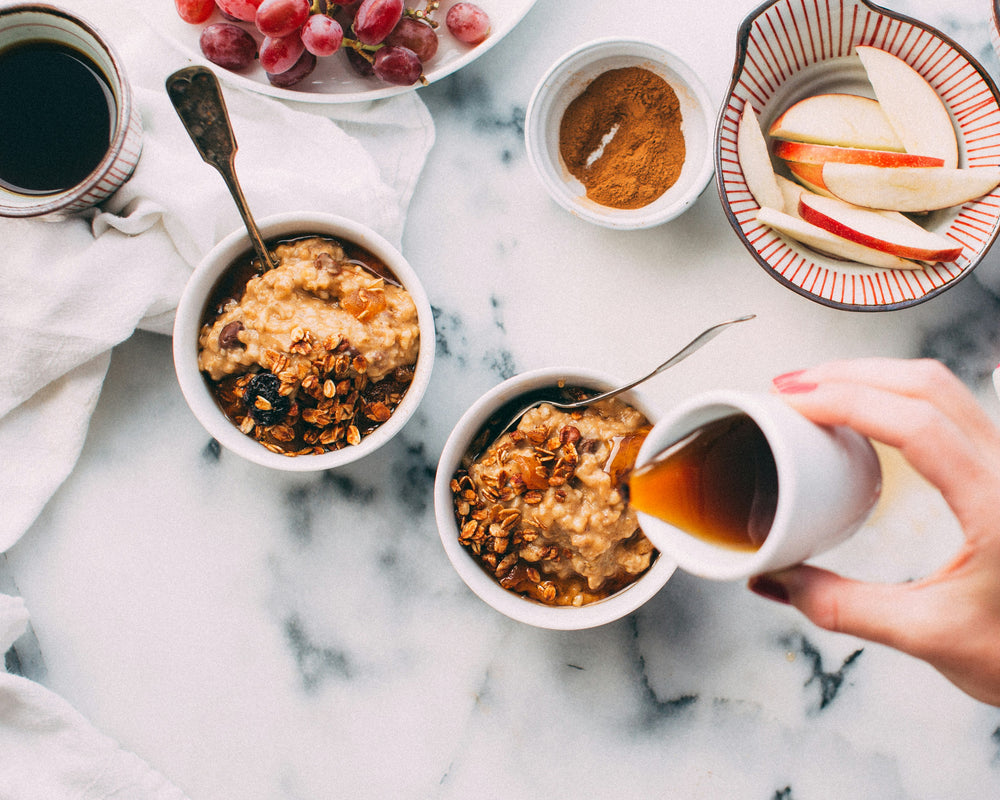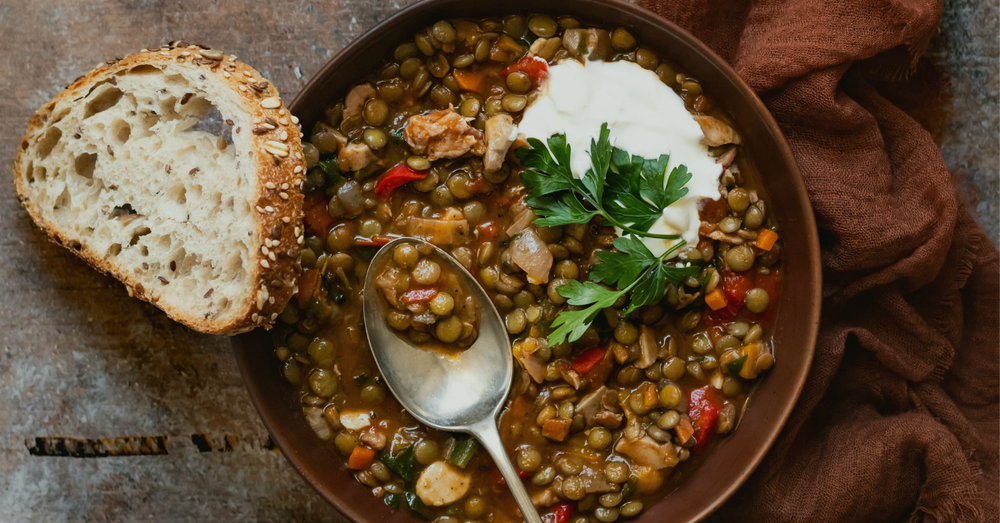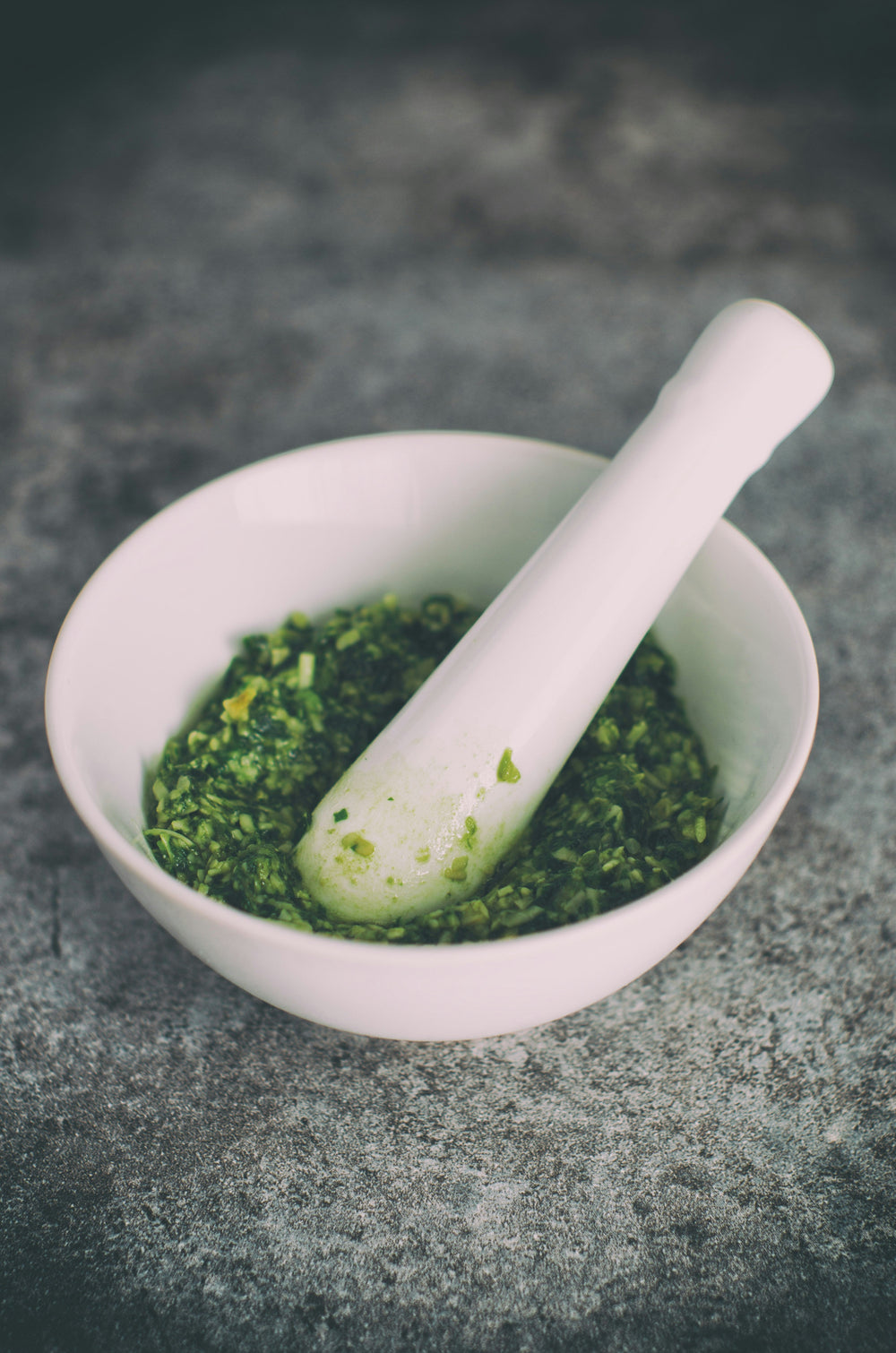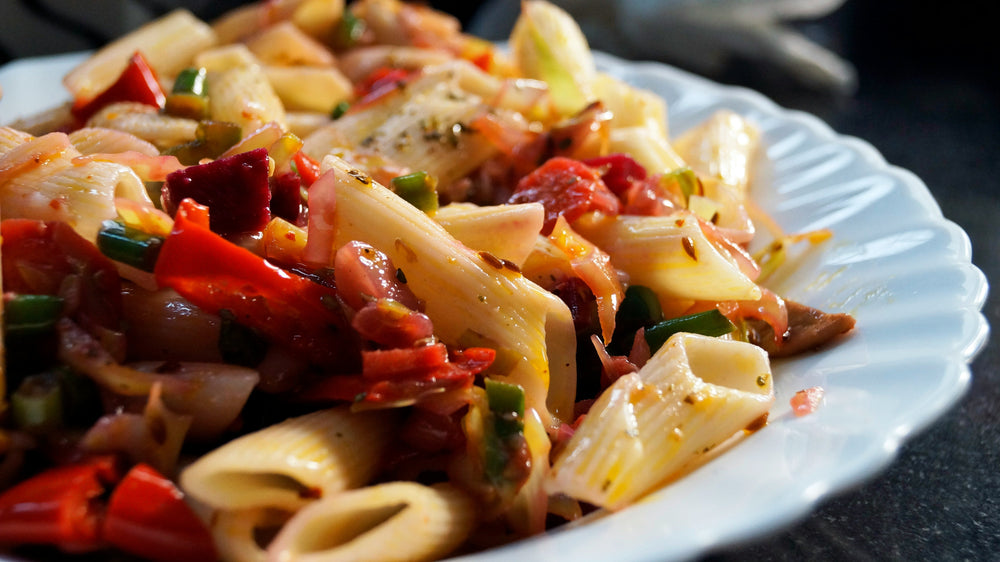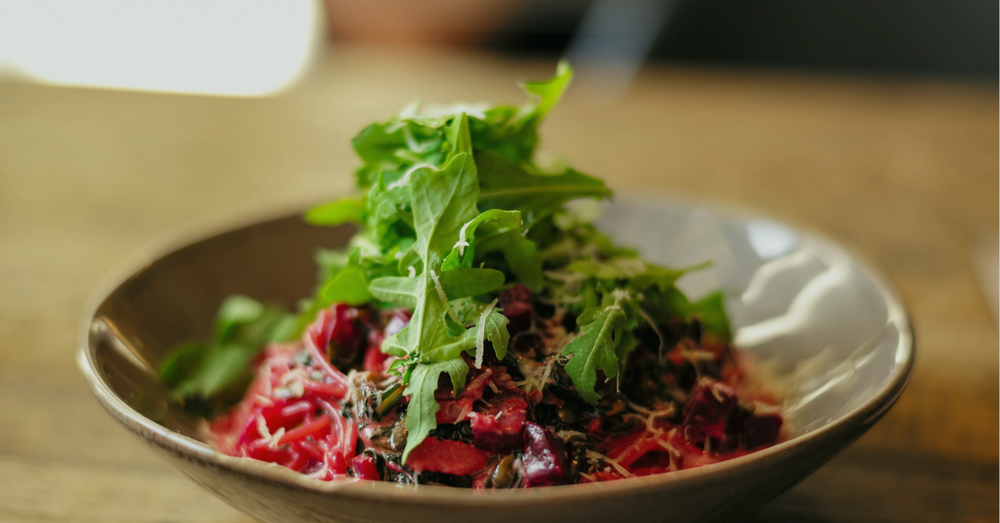This creamy green soup brings together broccoli, cauliflower, and kale for a delicious bowl that feels both comforting and energising. Finished with crispy chickpeas and toasted almonds, it is an easy way to enjoy a whole day’s worth of greens in one simple, nourishing meal.
5 reasons why you need prebiotics.
Prebiotics: The Unsung Heroes of Gut Health When we think about gut health, probiotics often take centre stage. But did you know that without prebiotics, probiotics might not function as effectively? Prebiotics are a type of fibre that nourish beneficial gut bacteria, helping them thrive and support overall digestive well-being. Incorporating prebiotics into your routine can enhance the effectiveness of probiotics, ensuring that the good bacteria you're introducing to your gut have the nourishment they need to survive and multiply. Why Combine Prebiotics with Probiotics? 1. Supporting Probiotic SurvivalProbiotics need fuel to stay alive and perform their functions. Prebiotics act as this fuel, aiding in the growth and colonisation of beneficial bacteria in the gut. 2. Enhancing Gut Microbiome DiversityA diverse gut microbiome is a hallmark of good health. Prebiotics encourage the growth of various beneficial bacteria strains, contributing to a balanced and resilient gut environment. 3. Improving Digestion and Nutrient AbsorptionBy promoting the growth of bacteria that aid digestion, prebiotics can lead to better nutrient absorption and a healthier gut environment. 4. Supporting Immune FunctionA significant portion of the immune system resides in the gut. A well-nourished microbiome can help strengthen immunity and maintain overall health. 5. Reducing Digestive DiscomfortBy fostering a balanced microbiome, prebiotics can help alleviate digestive issues like bloating and irregularity. Inulin vs. FOS: Understanding Common Prebiotics Two prevalent prebiotics found in supplements are inulin and fructooligosaccharides (FOS). While both support gut health, they have distinct characteristics: Inulin A longer-chain prebiotic fibre that ferments slowly in the gut. Provides sustained nourishment for gut bacteria over time. May cause mild bloating in some individuals due to its slower fermentation. FOS (Fructooligosaccharides) A shorter-chain prebiotic that ferments more quickly. Rapidly stimulates the growth of beneficial bacteria like Bifidobacteria. Generally well-tolerated in smaller doses Thanks to its rapid fermentation...

Prebiotics: The Unsung Heroes of Gut Health
When we think about gut health, probiotics often take centre stage. But did you know that without prebiotics, probiotics might not function as effectively? Prebiotics are a type of fibre that nourish beneficial gut bacteria, helping them thrive and support overall digestive well-being. Incorporating prebiotics into your routine can enhance the effectiveness of probiotics, ensuring that the good bacteria you're introducing to your gut have the nourishment they need to survive and multiply.
Why Combine Prebiotics with Probiotics?
1. Supporting Probiotic Survival
Probiotics need fuel to stay alive and perform their functions. Prebiotics act as this fuel, aiding in the growth and colonisation of beneficial bacteria in the gut.
2. Enhancing Gut Microbiome Diversity
A diverse gut microbiome is a hallmark of good health. Prebiotics encourage the growth of various beneficial bacteria strains, contributing to a balanced and resilient gut environment.
3. Improving Digestion and Nutrient Absorption
By promoting the growth of bacteria that aid digestion, prebiotics can lead to better nutrient absorption and a healthier gut environment.
4. Supporting Immune Function
A significant portion of the immune system resides in the gut. A well-nourished microbiome can help strengthen immunity and maintain overall health.
5. Reducing Digestive Discomfort
By fostering a balanced microbiome, prebiotics can help alleviate digestive issues like bloating and irregularity.
Inulin vs. FOS: Understanding Common Prebiotics
Two prevalent prebiotics found in supplements are inulin and fructooligosaccharides (FOS). While both support gut health, they have distinct characteristics:
Inulin
-
A longer-chain prebiotic fibre that ferments slowly in the gut.
-
Provides sustained nourishment for gut bacteria over time.
-
May cause mild bloating in some individuals due to its slower fermentation.
FOS (Fructooligosaccharides)
-
A shorter-chain prebiotic that ferments more quickly.
-
Rapidly stimulates the growth of beneficial bacteria like Bifidobacteria.
-
Generally well-tolerated in smaller doses
Thanks to its rapid fermentation and gentle nature, FOS could be a better choice for those looking to support their gut without the bloating sometimes associated with longer-chain fibres like inulin.
Final Thoughts
While probiotics are essential for gut health, they need prebiotics to truly thrive. By choosing a supplement that includes prebiotics like FOS, you're providing your gut microbiome with comprehensive support. Whether you're aiming to improve digestion or bolster immunity, a combination of probiotics and prebiotics can be a valuable addition to your health routine.
References
Al-Habsi, N., Al-Khalili, M., Haque, S. A., Elias, M., Al Olqi, N., & Al Uraimi, T. (2024). Health benefits of prebiotics, probiotics, synbiotics, and postbiotics. Nutrients, 16(22), 3955. https://doi.org/10.3390/nu16223955
Dou, Y., Yu, X., Luo, Y., Chen, B., Ma, D., & Zhu, J. (2022). Effect of fructooligosaccharides supplementation on the gut microbiota in humans: A systematic review and meta-analysis. Nutrients, 14(16), 3298. https://doi.org/10.3390/nu14163298
Roberfroid, M., Gibson, G. R., Hoyles, L., McCartney, A. L., Rastall, R., Rowland, I., Wolvers, D., Watzl, B., Szajewska, H., Stahl, B., Guarner, F., Respondek, F., Whelan, K., Coxam, V., Davicco, M. J., Léotoing, L., Wittrant, Y., Delzenne, N. M., Cani, P. D., Neyrinck, A. M., & Meheust, A. (2010). Prebiotic effects: Metabolic and health benefits. British Journal of Nutrition, 104(S2), S1–S63. https://doi.org/10.1017/S0007114510003363
lifestyle. gut health recipes.
ready in 10 minutes
herb-whipped cottage cheese chicken bagels.
These basil whipped cottage cheese protein bagels make a fresh, high-protein breakfast or lunch, combining creamy herb-blended cottage cheese with juicy chicken, rocket, and tomatoes. They’re quick to assemble, packed with flavour, and perfect for a nourishing breakfast or light lunch.
ready in 10 minutes
kiwi chocolate protein chia pots.
These Kiwi Chocolate Protein Chia Pots make an ideal high-fibre, high-protein breakfast that keeps you full and energised all morning. They’re quick to prepare, easy to store, and perfect for a healthy grab-and-go option.
ready in 15 minutes
spiced apple porridge.
This spiced apple and pumpkin seed porridge is a warming, high-fibre breakfast that’s perfect for cosy mornings. Made with creamy oats, gently caramelised apples and a crunchy pumpkin seed topping, it’s ready in just 15 minutes and serves one.
ready in 50 minutes
prep-ahead baked blueberry oats.
These prep-ahead oven-baked oats with blueberries and bananas are rich in protein and fibre, making them a nourishing, gut-friendly breakfast to enjoy all week.
ready in 15 minutes
spicy green eggs with feta.
These spicy green eggs with feta are a quick, protein-rich recipe packed with gut-friendly ingredients like spinach, courgette, and spring onion. Baked in the oven or air fryer, they’re simple to make, full of flavour, and support digestion with a balance of fibre, protein, and healthy fats. Perfect for breakfast, brunch, or a light meal, this vibrant dish proves that nourishing your gut can be both delicious and easy.
ready in 10 minutes
egg wrap with pesto.
Bright, fresh, and ready in just 10 minutes, this flavour-packed wrap serves one and is ideal for breakfast, lunch, or any time you’re after something simple yet filling.
ready in 10 minutes
peach cobbler overnight oats.
Start your day with a gut-friendly twist on a classic dessert. The peach cobbler overnight oats serve 2–3 and takes just 10 minutes to prepare the night before. Packed with fibre, flavour and feel-good ingredients, it’s the perfect make-ahead option for busy mornings or a nourishing snack you can enjoy any time of day.
ready in 15 minutes
smoky egg salad bagel crunch.
This smoky harissa egg bagel is the perfect 15-minute meal. Made with creamy Greek yoghurt, tangy pickles, and a hint of spice, it’s a high-protein twist on classic egg salad that delivers on both taste and texture. Ideal for busy days, this easy bagel recipe makes lunch feel gourmet without the effort.
ready in 20 minutes
chewy breakfast matcha protein cookies.
Soft, satisfying, and subtly sweet—these breakfast cookies are made to fuel your morning the right way. With fibre-rich oats, plant-based protein, and antioxidant-packed matcha, they’re a gut-friendly grab-and-go option that doesn’t compromise on flavour or function.
ready in 15 minutes
lemon & poppy seed pancakes.
Emily's light, gut-friendly crêpes are the perfect balance of fibre, protein, and healthy fats to support digestion and keep you feeling great.
ready in 10 minutes
carrot cake breakfast oats.
Start your day with a delicious and nutritious breakfast option - Carrot Cake Oats. Filled with fibre diversity to promote healthy digestion.












